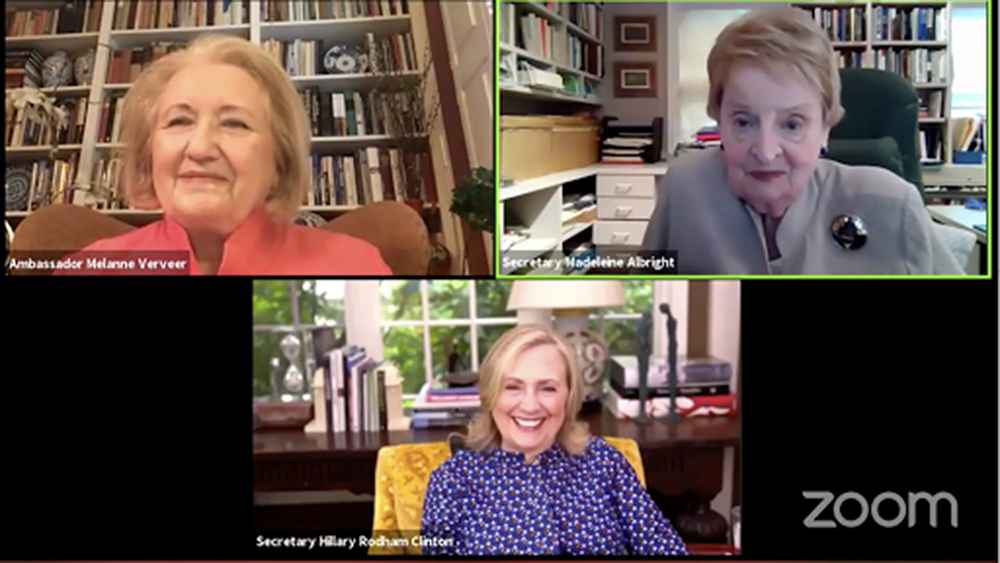Significant work remains to be done in the global fight for women’s rights, according to former Secretaries of State Hillary Clinton and Madeleine Albright, who spoke at a virtual event Sept. 10.
The conversation focused on the 25th anniversary of the United Nations Fourth World Conference on Women, which took place in Beijing, China in 1995. The conference is seen as a significant turning point for gender equality due to the passage of the Beijing Declaration and Platform for Action on women’s rights, which set an agenda to combat gender inequality around the world. The declaration focused on 12 policy areas, including equal access to education and gender-based violence. Clinton and Albright both attended the conference in Beijing as part of the United States’ delegation.

The event, moderated by Ambassador for Global Women’s Issues Melanne Verveer, was organized by the Georgetown Institute for Women, Peace and Security, an organization that aims to promote women leaders in international diplomacy.
Clinton, who was first lady at the time of the conference, said she is concerned about a lack of progress on gender equality since the Beijing summit. Clinton noted underrepresentation of women in elected offices and the business sector as evidence that sexism persists across the globe.
“I’m disappointed that we haven’t gone even farther in 25 years,” Clinton said. “But that just energizes me more to speak out to work with others to defend those who are on the front lines.”
The former presidential candidate pointed to decreasing maternal mortality rates and rising education levels among women as signs of progress. Clinton expressed worry, however, that the recent resurgence of authoritarianism across the globe will undermine the progress that has been made.
“I’m worried about the pushback and the backlash that we see from authoritarian leaders in particular, who are trying to turn the clock back,” Clinton said.
Albright, who was serving as U.S. ambassador to the UN in 1995, discussed the conference and the challenges of organizing a global summit on women’s issues, particularly in China.
“The Chinese didn’t want the official delegates, and they certainly didn’t want the nongovernmental organizations there, and so they made it very difficult,” Albright said.
Clinton said she also faced intense political opposition in the lead-up to the event from Senate Republicans, who told her it was inappropriate to attend the conference.
“I told members of the administration in the White House and the State Department that if I didn’t go with the blessing of our government, I was going to get on a commercial plane and go,” Clinton said.
Clinton credited Albright’s tenure as secretary of state from 1997 to 2001 as a crucial step in actualizing the reforms that were developed at the conference.
“When she became our first ever woman secretary of state, she really made it clear that the agenda coming out of Beijing was not just a luxury that, you know, would be nice to think about when we had time, but actually integrated into our foreign policy,” Clinton said of Albright.
Clinton, who herself became secretary of state during the Obama presidency, recalled her — now famous — speech at the conference, “Women’s Rights Are Human Rights,” which sought to promote the idea that advocacy for human rights was incomplete without a commitment to advancing the position of women throughout the globe.
“I wanted to push the envelope as far as I could for girls and women,” Clinton said. “We were determined to try to carry a message about the United States and our commitment — including ourselves, however — in the need to do better on women’s equality.”
The ongoing COVID-19 pandemic has only underscored the progress that remains to be made on gender equity, according to Clinton. Experts have found the economic downturn triggered by the outbreak has taken a disproportionate hit on women, with women accounting for 39% of global employment but 54% of job losses during the crisis.
“Governments have to pay particular attention to rebuilding a post-COVID safety net and understanding the disproportionate costs that many people are bearing,” Clinton said. “They had nothing to do with creating this virus, but they are left holding the bag of burden.”
The panelists also agreed leaders will need to pay special attention to the needs of women of color and other marginalized groups.
“We have to do a better job of recognizing the additional challenges that stand in the way of equality,” Clinton said. “I think that the question really comes down to supporting and lifting up and giving more prevalence in public debate and decision making.”
To progress towards greater gender equality, Albright urged women to support each other in the workforce and advocated for increased access to technology in developing countries. For progress to be made, governments need to devote themselves to sustained reform efforts, according to Albright.
“Nothing happens automatically,”Albright said. “I think we can see that we can all be proud of Beijing, and many of us have tried to carry on, but it requires deliberate action.”




















